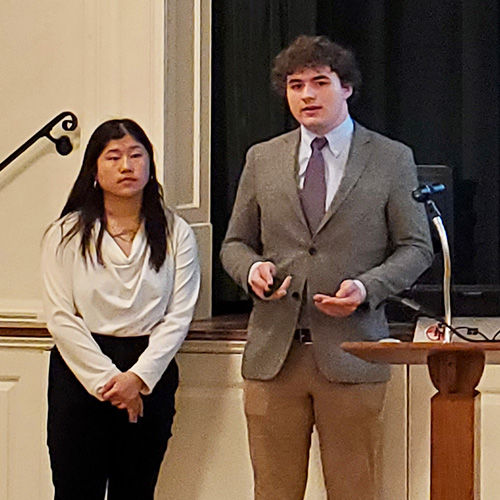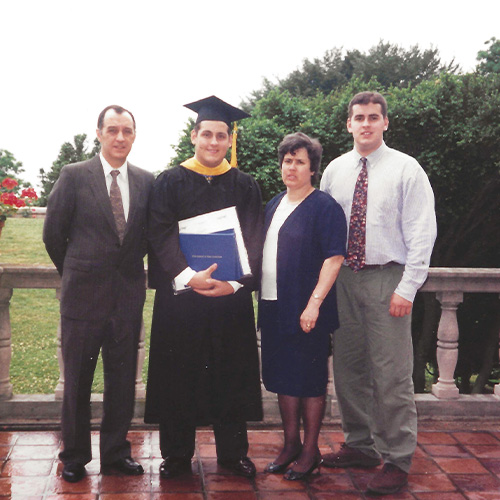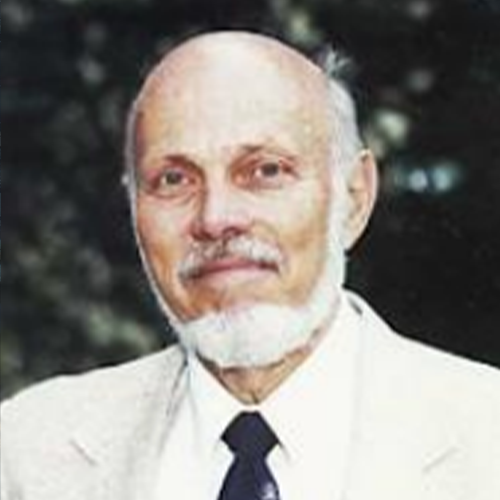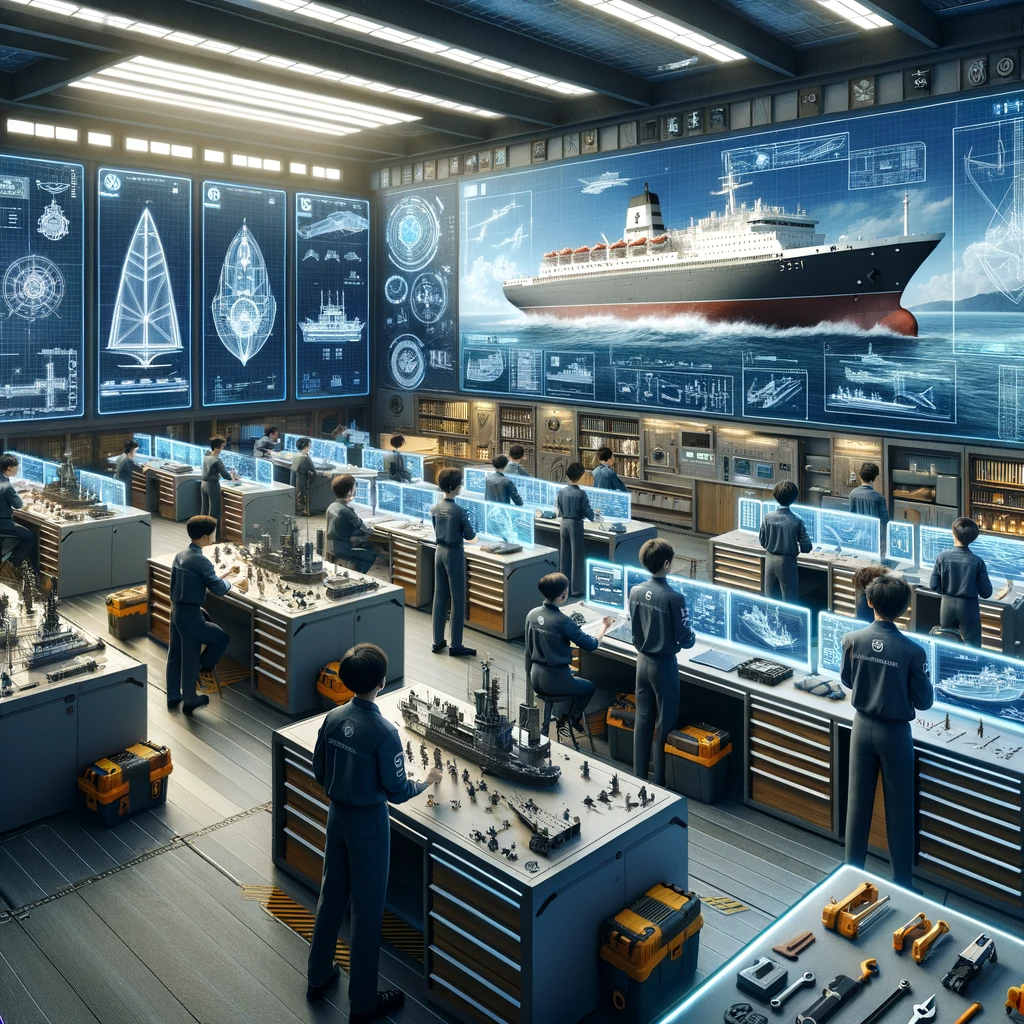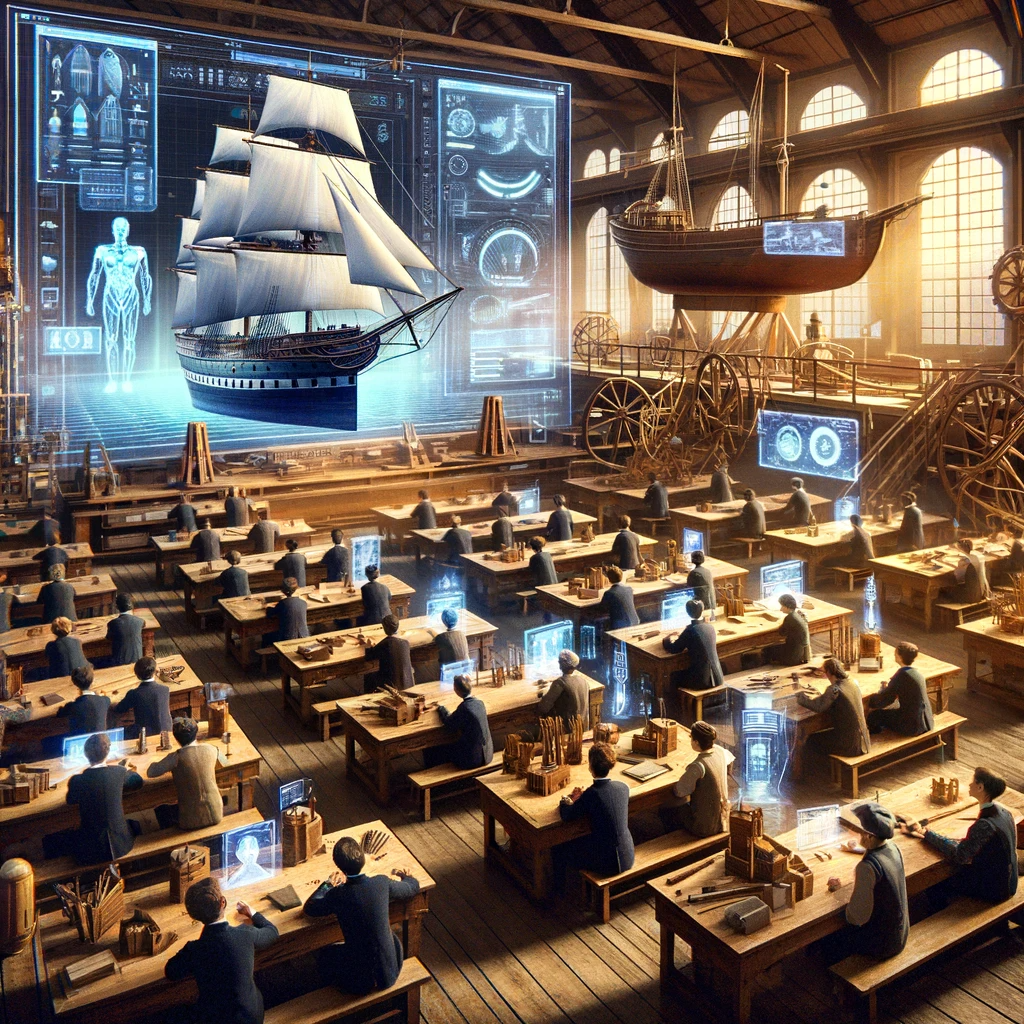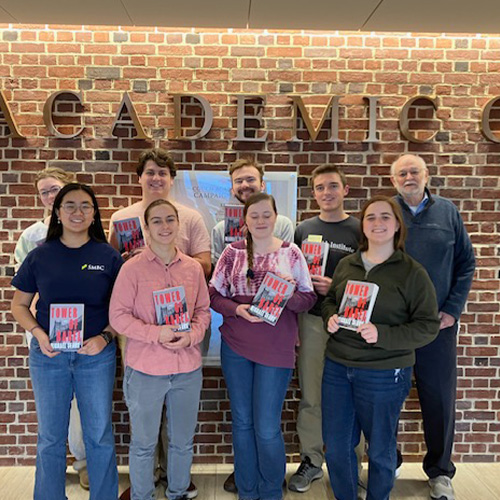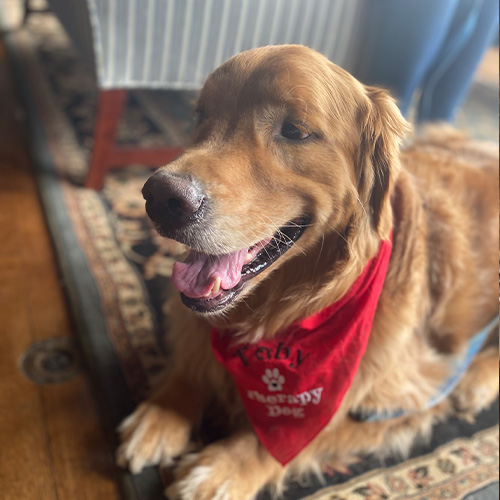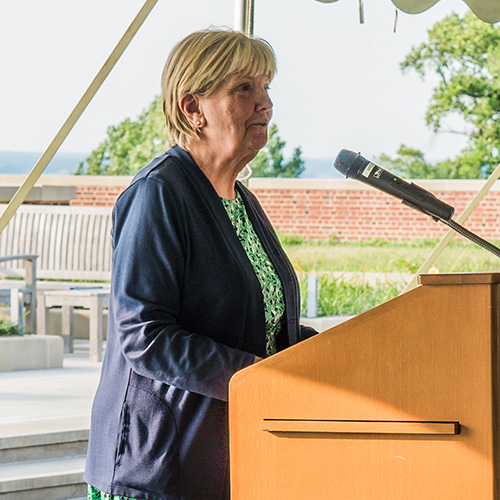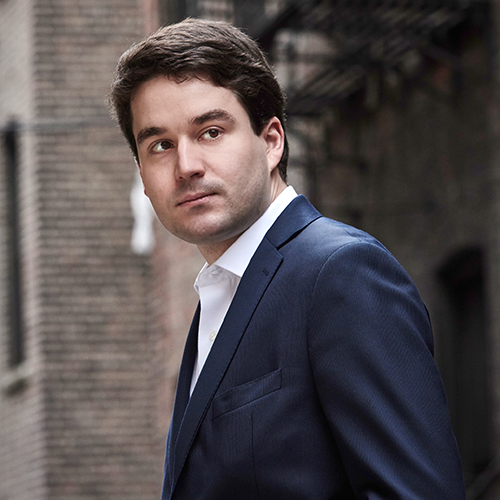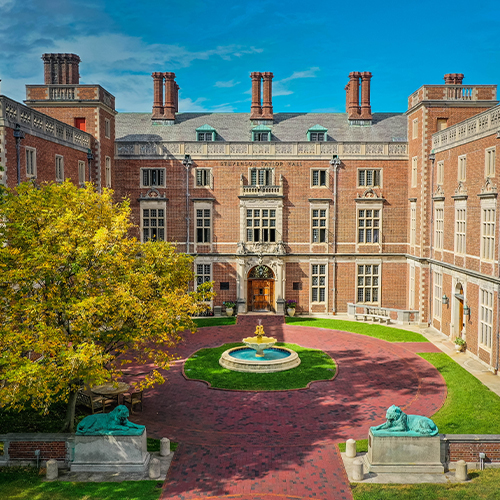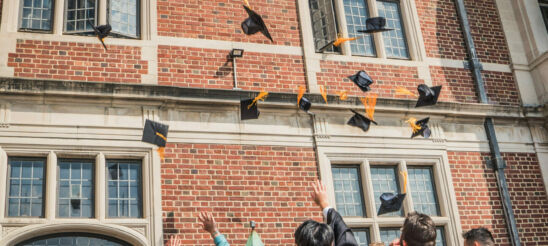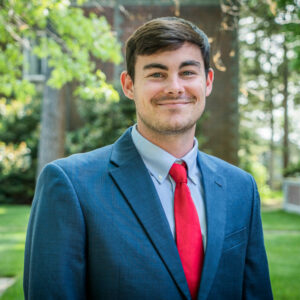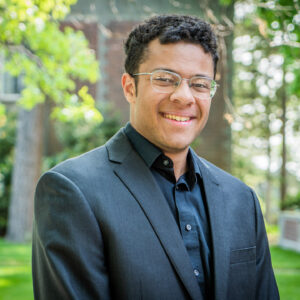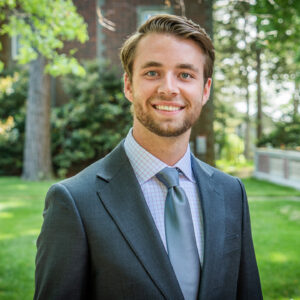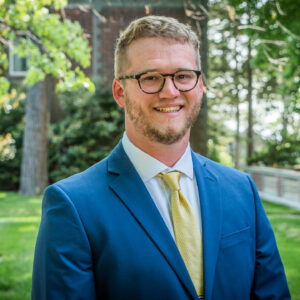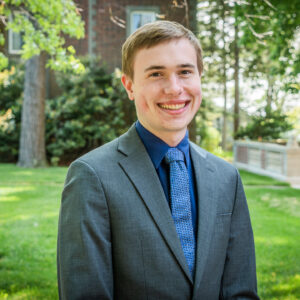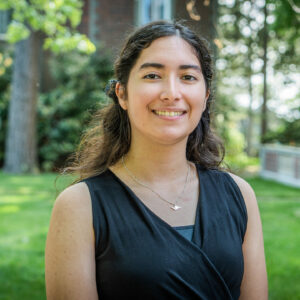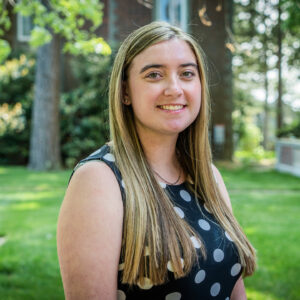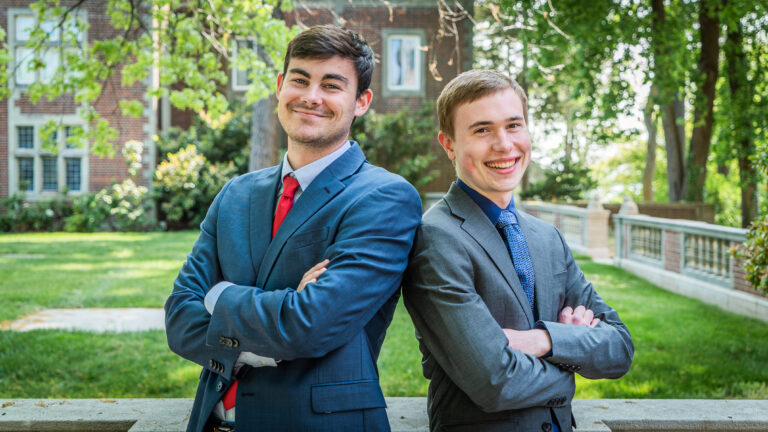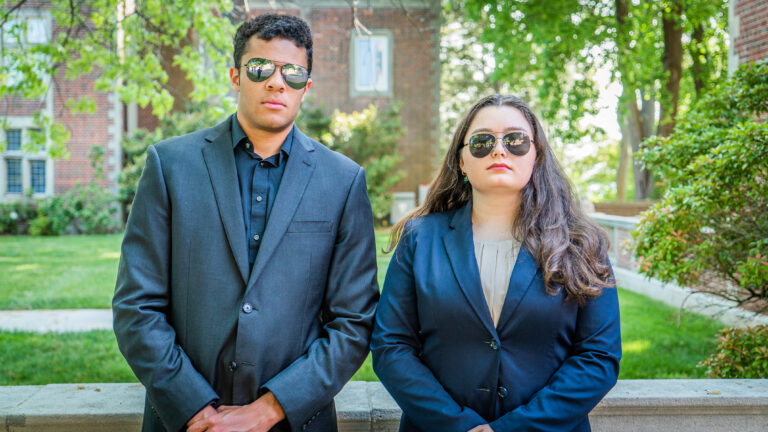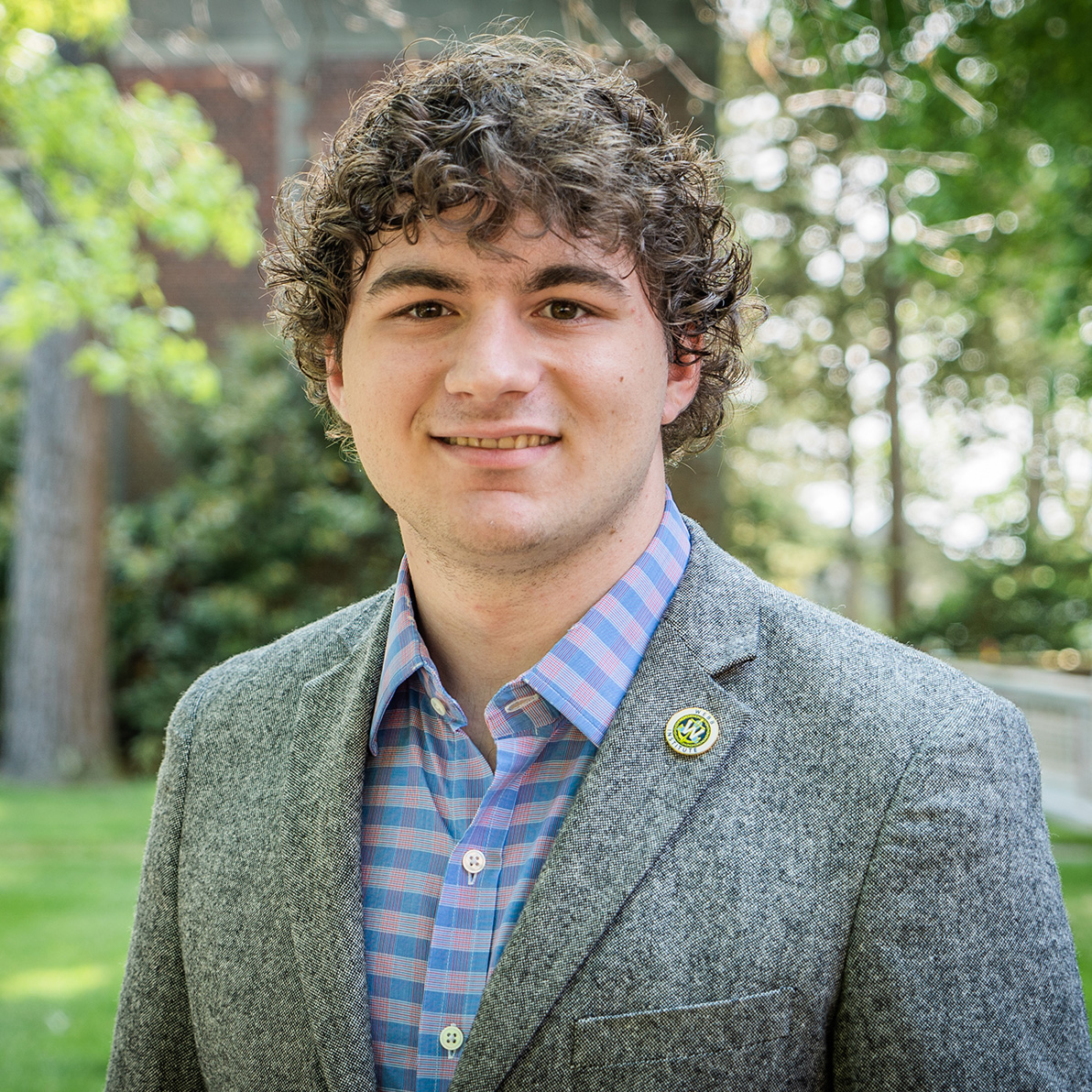
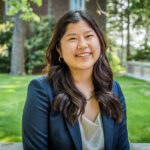 By Spencer Margosian ’23 and Tori Kim ’23
By Spencer Margosian ’23 and Tori Kim ’23
It is the beauty of research that in pursuit of solving even a seemingly simple problem, one will inevitably discover far more new problems to solve than they will answers to publish. Looking back on the past year, the best example of this was when our electrical engineering thesis was almost completely derailed for well over a month, by a problem fundamental to naval architecture. In this article, we would like to discuss how we came across this problem, how we solved it, and how this detour in our work taught us a fundamental principle of research. The minimum viable background for discussion of our thesis takes about four sentences. For large vessels, medium-voltage alternating current is usually used to transmit electrical power.
An emerging technology, medium-voltage direct current power transmission, is poised to be ready for commercial application approximately within the next decade. Because MVDC is a new technology, it is not well known to marine engineers and will likely be underutilized if it remains unknown.
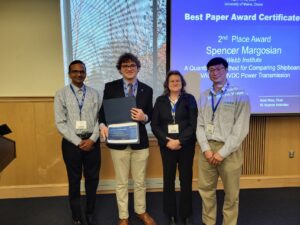
Spencer Margosian ’23 accepting his award during SNAME’s Student Paper night.
Our thesis sets out to identify in simple terms whether MVAC or MVDC is the better system model for a given application so that a marine engineer does not need to do so from first principles. The first time we attempted to compare the two
system models directly, we created two calculation methods which modeled steady-state operation of a given vessel. When we tested the two methods with a computer script, the answers they returned looked like they made sense when considered one-at-a-time. Upon examining the entire set of cases, however, we realized that not a single case actually implied that DC was preferable to AC—not even those which we were positive would be.
The discovery of this fault effectively stopped us in our tracks, not knowing what we had done wrong or how we might fix our program to account for such error. To solve this problem, we would have to embrace a core principle of research: that setting out to solve a problem in one field will often result in encountering new problems in unrelated ones. Following the failure of the original analysis, we would come to realize that using a steady-state analysis failed to account for the biggest advantage of MVDC systems, which is their high efficiency in loads which vary over time. This meant that to properly compare the two system models, it would be necessary to model them as dynamic systems and not constant signals.
“We are immensely grateful to Webb for preparing us not only with the education in marine engineering necessary to understand marine electrical engineering, but also for providing us the naval architecture background that we needed to solve our resistance problem. Despite neither of us identifying as naval architects at heart, the Webb education prepared us to tackle every problem our research threw at us.”
We had found a new problem to solve—how does a ship’s electrical load change throughout a voyage?—and despite our original research being one of theoretical electrical engineering, the answer to our new question relied almost exclusively on our understanding of naval architecture.
The biggest load experienced by a ship at sea is naturally the energy required to propel the vessel through the water. As a ship sails through waves, the resistance imparted on the vessel varies constantly, changing the propulsion power. This phenomenon, called added wave resistance, cannot be easily predicted using statistics—in fact, it is not analytically possible to do so. However, by algebraically manipulating a well-documented standardized wave spectrum, we were able to closely approximate what the added wave resistance spectrum would look like and solve our original problem of characterizing how resistance varies over a voyage.
Watch Spencer and Tori’s Thesis Presentation below:
Click here to view the Class of 2023 Thesis Page
First-Generation College Graduate to Finance Chair
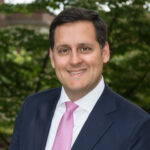 By Paulo Almeida ’95
By Paulo Almeida ’95
Background
I’m a first-generation college graduate and first-generation American from Danbury, CT, which unsurprisingly was recently rated the most diverse (ethnic, religious and socio-economic) city in New England. My parents grew up 15 miles apart in Portugal but met in Danbury, to where many people emigrated from the mountainous parts of Portugal and the Azores. My father moved solo after military service in what was Portuguese Mozambique then a stint in Nashua, NH. My mother’s entire close family immigrated in the mid 60s after earlier generations (including my grandmother who turned 102 a few months ago) returned to Portugal from New Bedford, MA during the Great Depression. Friends who know my roundabout transatlantic family history say it is not a surprise that I wound up in London. Despite being an ocean away, I’m happy to be very close to Webb in several ways.
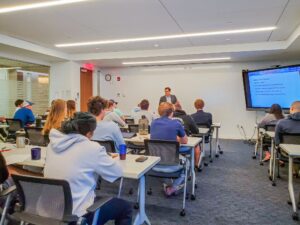
Paulo Almeida ’95 giving a guest lecture at Webb
Value of Hard Work and Education
With essentially all of my interactions until kindergarten being Portuguese-speaking extended family and babysitters – other than a bit of Sesame Street and cartoons – I entered kindergarten with very little English. With the US generally being a great assimilator and probably some long-forgotten hard work from me, I, along with my brother and cousins in the same boat, quickly graduated to English as our first language. My parents came to the US with little more than decent job prospects through family friends, so we all saw the value of both hard work generally and education specifically. My parents invested in Catholic schooling – and lots of Lego – for me and my brother. My parents happily paid for my brother to get his mechanical engineering degree at Rensselear, and would have done the same for me, but surely it was more comfortable all around that I had a full-tuition scholarship at Webb. With socio-economic mobility nowadays not being as strong as it was in the 70s to 90s, and although the US is still far ahead of most of the world, the full-tuition scholarship at Webb is so valuable – even if it is not quite enough to meet the needs of all.
Finding Webb
I only barely remember now but after my parents dissuaded 12-year old me from trying to become a chef or start my own construction company (Thank you again for that!), surely I wanted to be an engineer. I investigated top engineering programs in the Northeast then visited several. Webb was love at first sight. First literally, because of the amazing campus, but also the small tight-knit community. Secondly, the pitch to me from an underclassman that ships are the perfect type of machinery to design because they involve disparate, challenging, interesting topics while at the same time many ships are simple enough that one person could complete the most interesting 80% of the design, leaving the detailed but often less interesting work to others. While this description is probably not 80% true, it is very powerful and I do very regularly repeat it. Unlike many Webbies who were very interested in sailing or military ships, although I was always fond of submarines, it was global commercial shipping that appealed to me. It is the intersection of my loves of applied science, geography and economics. Through yet another circuitous route, this led to me running a portfolio of over 60 ships from London for institutional investors. The practical aspects of the Webb education were big selling points to me. This was primarily winter work, but also field trips. With hard work being so highly valued from a very early age due to my family background, and at one point having wanted to start my own business before I was 20, the practical experience was a big differentiator versus other programs. Winter work also helped build lifelong bonds. I was lucky enough to not only be with Dean Werner twice for winter work but also celebrate his wife’s birthdays then. My favorite field trip was to the Sealand Quality, arranged by fellow Trustee Manny Hontoria. The legendary late Prof. Rowen in his characteristic wit said it could have been called the Sealand High Quality if it only had an MAN B&W engine!
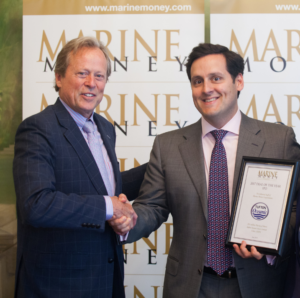
Paulo Almeida ’95 receiving the 2018 Marine Money Deal of the Year Award
Achieving My Goals After Graduation
My Webb education, both in the narrow and broader senses, gave me a strong intellectual foundation, commitment to hard work and confidence that I could then build upon in my career. It prepared me well for being one of the youngest Masters in Finance (“MiF”) students at London Business School in ‘99/’00 and later among the older Chicago Booth executive MBAs in London ‘16-‘18, as well as my time in investment banking and investment management. Towards the end of my MiF, due to reasons familiar at Webb, I pulled an all-nighter after only basic knowledge of a math modelling package to design and price a complex financial derivative that earned an A+. Since completing my MiF, I have worked in high-performing organizations, advising on large corporate deals or equity raisings, bidding on large infrastructure assets and most recently building and running a large portfolio of globally-trading commercial ships with capital raised from very sophisticated investors including large pension funds. My personal background and Webb education gave me the broad and deep technical foundations and confidence to succeed.
Giving Back
Coming back to an earlier point, I’m an ocean away from Webb but am privileged and extremely pleased to be very close in several ways. After all, the traits I brought to and that were reinforced by my Webb education gave me the skills and confidence to facilitate my transatlantic journey and professional evolution. I’ve been lucky enough to be in a position where I can increasingly give back meaningfully financially. Separately, for nearly at least 7 years I’ve been giving a guest lecture to freshmen on buying a ship, making analogies to buying a house while also touching on many of the interesting commercial aspects of the global shipping industry. Other than family celebrations / holidays, this is always one of my favorite days of the year. A few years ago I joined the Webb Board of Trustees, and soon became Finance Chair as a small part of a broader well-planned succession program. We have such a strong, dedicated and increasingly diverse Board. This shows just how important Webb is not only to alumni, but the maritime industry. As John Malone and of course others say about the Heritage Society, it is never too early or too late to give back. I’ve been lucky and very pleased to be able to give back in different ways, and especially hope this helps well-deserving students who also want to give back however they can in the future.
Remembering Dr. Bruce Stephan
The Webb community mourns the passing of Dr. Bruce Stephan, who left us peacefully on December 28, 2023, at the age of 81. A native New Yorker, Dr. Stephan touched generations of Webb students through his 35-year career as a professor of mathematics at Webb Institute. He retired on June 30, 2007, and then became a Faculty Emeritus of Mathematics.
Even after retirement, Dr. Stephan’s love for teaching never dimmed. He taught his own children and grandchildren and tutored many others.
Dr. Stephan was an avid musician as well as a polyglot who was fluent in German and Russian. He loved to travel and explore distant lands with his wife, Jan, and their family. He wanted to ensure that each grandchild experienced his love of travel through carefully planned trips that broadened their horizons.
Rest in peace, Dr. Stephan.
The Role of Artificial Intelligence in Webb’s Academic Program
By Matthew R. Werner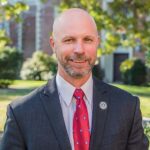
Dean & ABS Chair of Naval Architecture and Marine Engineering
Much has been said and written about the rapid development of AI, and the opportunities, challenges, and risks that this technological revolution creates. In academia, concerns have been raised about the dangers to academic integrity that tools such as ChatGPT pose.
Will term papers be the product of a student’s labor or the output of an AI-powered language model? How can a course instructor be assured that the solutions on a student’s exam were not sourced through an online resource that uses the latest in AI. This past summer, Matthew Collette ’99 Professor of Naval Architecture at the University of Michigan posted to LinkedIn that through his testing he found that ChatGPT was able to score a “B” on typical questions from his hydrostatics course, and therefore validating the concerns of educators.

Image created by Dall-E
The faculty at Webb shares the concerns about academic integrity expressed by our peers throughout academia. At the same time, as engineering educators we cannot help but to be excited about the capabilities and possibilities of AI. AI tools have the promise to greatly augment the abilities of naval architects and marine engineers. Over the past several years, projects at Webb have explored the use of AI and machine learning on problems such as planning craft ride control and autonomous vessel maneuvering and collision avoidance. There are many ongoing projects across the breadth of the marine industry that seek to benefit from the capabilities of AI. Recent journal articles and news reports explore opportunities to improve ship design, construction, and operations through the application of AI tools.
Webb is fortunate to have the tradition of a robust honor code that is integral to our academic program. The faculty feel confident that the honor code and Webb’s collaborative learning environment will allow the school to navigate the implementation of incorporating AI in an undergraduate program. The faculty’s direction to the students can be summarized as follows: AI is a powerful tool that can enable learning, and it is appropriate to use AI tools for the acquisition of knowledge and the development of skills. Academic integrity is violated when AI is used to do the work for the student, such as writing a paper or solving a complex math problem. The intentional misuse of AI on academic assignments and assessments is an honor code violation.
To ensure that there is a clear understanding between students and faculty of what constitutes acceptable AI usage, this semester the faculty members added statements explaining the limitations on the usage of AI tools in their course policies. In addition, course instructors were encouraged to discuss with the students at the start of the semester their expectations regarding the use of AI in their course. Technology, subject matter, and teaching methods may evolve over time but the commitment to academic integrity and honor are Webb standards that must be and will be maintained.
Images Created by Dall-ENoted Author Visits Webb Fiction Writing Class
On November 30 best-selling mystery author Michael Sears visited Professor Richard Harris’s junior elective class in Fiction Writing to discuss his career and writing methods and experiences. After his graduation from the University of Maryland, Sears spent eight years as an actor, appearing in a number of Shakespearean productions as well as television shows. He then enrolled at Columbia University to earn an MBA and worked for two major Manhattan investment firms, rising to the position of Managing Director of each.
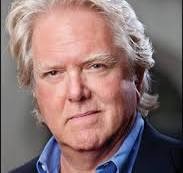
After twenty years on Wall Street, Sears decided to devote his time and efforts to writing. His 2013 novel Black Fridays, featuring detective Jason Stafford, was shortlisted for five major awards and recognized with the Shamus Prize, awarded annually to the best piece of American detective fiction. A series of Jason Stafford novels followed. With Tower of Babel (2022), Mr. Sears has begun a new series of New York novels, these set in Queens, as opposed to Manhattan. This novel was co-winner of an audio book award. Michael Sears presented each student in the class with an autographed copy of Tower of Babel.
In 2022 Michael Sears was honored with the prestigious Nero Award which recognizes excellence in the genre of mystery/detective fiction. He lives in Sea Cliff with his wife, artist and poet, Barbara Segal.
PAWS for a Study Break!
by Alyssa Caliguri, Associate Director of Admissions and Student Affairs
There are typically high levels of stress on college campuses during the weeks leading up to Final Exams. To help address this, a practice common across colleges in the U.S. involves bringing trained therapy dogs to their campuses to interact with their students and provide emotional support. Webb already has a long tradition of dogs visiting (or even residing on) campus. Over the past few years, Sully, Barney, Duke, Pebbles, Callie, Dan, Beau, Diego, Holly, and  other employee dogs have spent some time on campus with Webbies. On Tuesday, June 15th, two therapy dogs from Therapy Dogs of Long Island joined in on the fun and visited the Webb Institute campus. T to help relieve some stress before final exams. Toby, the golden retriever, and Lucy, a Labrador retriever, greeted students in the Visconti Reception Room and provided some well-deserved relief from the workload and studying. According to Therapy Dogs of Long Island, “Dogs can help improve mental and physical health, pain management, and behavior/interpersonal interaction.
other employee dogs have spent some time on campus with Webbies. On Tuesday, June 15th, two therapy dogs from Therapy Dogs of Long Island joined in on the fun and visited the Webb Institute campus. T to help relieve some stress before final exams. Toby, the golden retriever, and Lucy, a Labrador retriever, greeted students in the Visconti Reception Room and provided some well-deserved relief from the workload and studying. According to Therapy Dogs of Long Island, “Dogs can help improve mental and physical health, pain management, and behavior/interpersonal interaction.
Dogs can also reduce heart rate, blood pressure, fear and anxiety, and aggression.” Toby and Lucy brought unconditional love and many smiles to the students’ faces during this time.
There is something special and calming about a dog’s companionship, and its ability to understand feelings and situations around it, without ever having a conversation.
Marguerite Caliguri, Toby’s owner states, ” Bringing Toby to therapy visits has been very rewarding for both of us as a therapy dog team. Toby can really pick up on people’s feelings; at the same time, I’ve seen people’s attitude change completely for the better once they see Toby coming. It is also equally as rewarding for Toby to socialize, lend a paw, and brighten someone’s day. He thrives on being with people and seeing that he loves it so much, I knew I had to share it with as many people as I can.” Student wellness is key to academic success. The Office of Admissions and Student Affairs hopes to continue providing wellness initiatives throughout the upcoming year to help the students thrive in and out of the classroom environment.
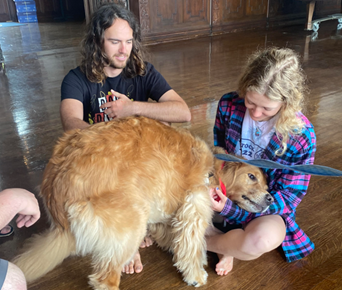
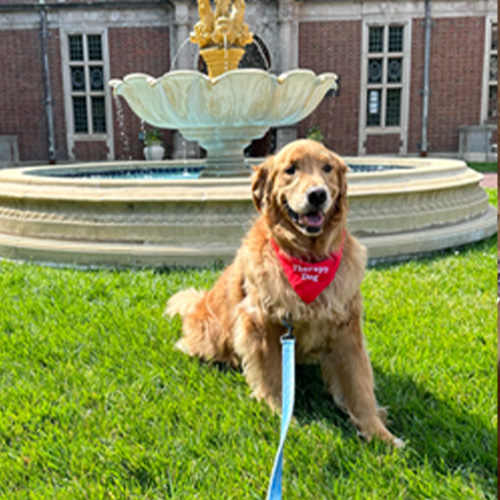
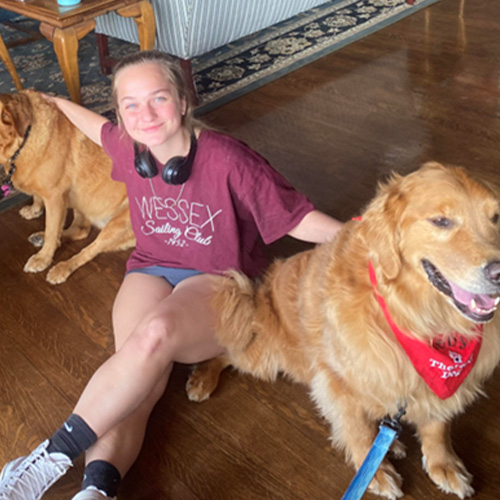
Josie Wilson’s Retirement
Among the hallowed halls of Webb and the Long Island Sound landscape, where memories have been woven over decades, we gathered to bid farewell to one of our most esteemed figures, Josie Wilson, the Director of Academic Services.
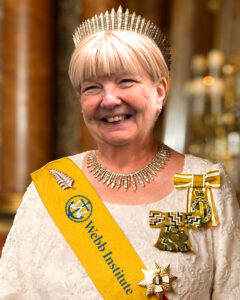
Webb’s very own Queen Josie
Over the years, Josie Wilson has been a beacon of guidance, inspiring countless students with her unwavering dedication and tireless service. As she announces her retirement, marking the onset of a well-deserved new chapter, we come together as a community to celebrate her legacy.
In June of 2023, at her retirement dinner, Josie took the stage to deliver her heartfelt speech. This momentous occasion was preceded by acknowledgments from President Mark Martecchini, and the Dean, Matthew Werner, both of whom honored Josie’s significant contributions and profound impact at Webb. Below, we revisit her touching farewell speech from Homecoming in May of 2023. It was a moment that brought a blend of smiles and tears, a testament to her profound impact.
Farewell, Josie, and may this new journey be filled with the same inspiration and excellence you’ve instilled in all of us.
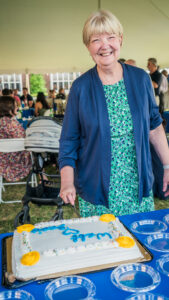
Josie cutting her celebratory cake
“As we all know, Webb Institute is a unique and special place, where students not only receive an excellent education, but also develop lifelong friendships, values, and passions. I have witnessed firsthand how students have grown from their shy first days on campus to confident seniors ready to contribute to the maritime industry.
As I look back on my 33 years here, I cherish the many moments I have shared with the students in the hallways, in my office for a tissue, a hug, or a piece of chocolate, or just to hang out and talk about a recent Winter Work experience or what they will be doing in the summer. You have inspired me and taught me so much too. You have given me joy, laughter, and friendship. You are more than just alumni; you have made me a part of the Webb family, which is truly an honor. The alumni are the reason why Webb Institute is such a wonderful place. And the reason why I am standing here today with a smile on my face and a tear in my eye.
When I was little, I always said when I grow up, I want to be a Mommy. And that dream came true. I was a Mom for many years of about 100 students a year. And I loved every minute of it. And one final thank you to William Webb. It was because of his insight to create such a wonderful, unique college that I have had the most fulfilling career anyone could ever hope for. ”
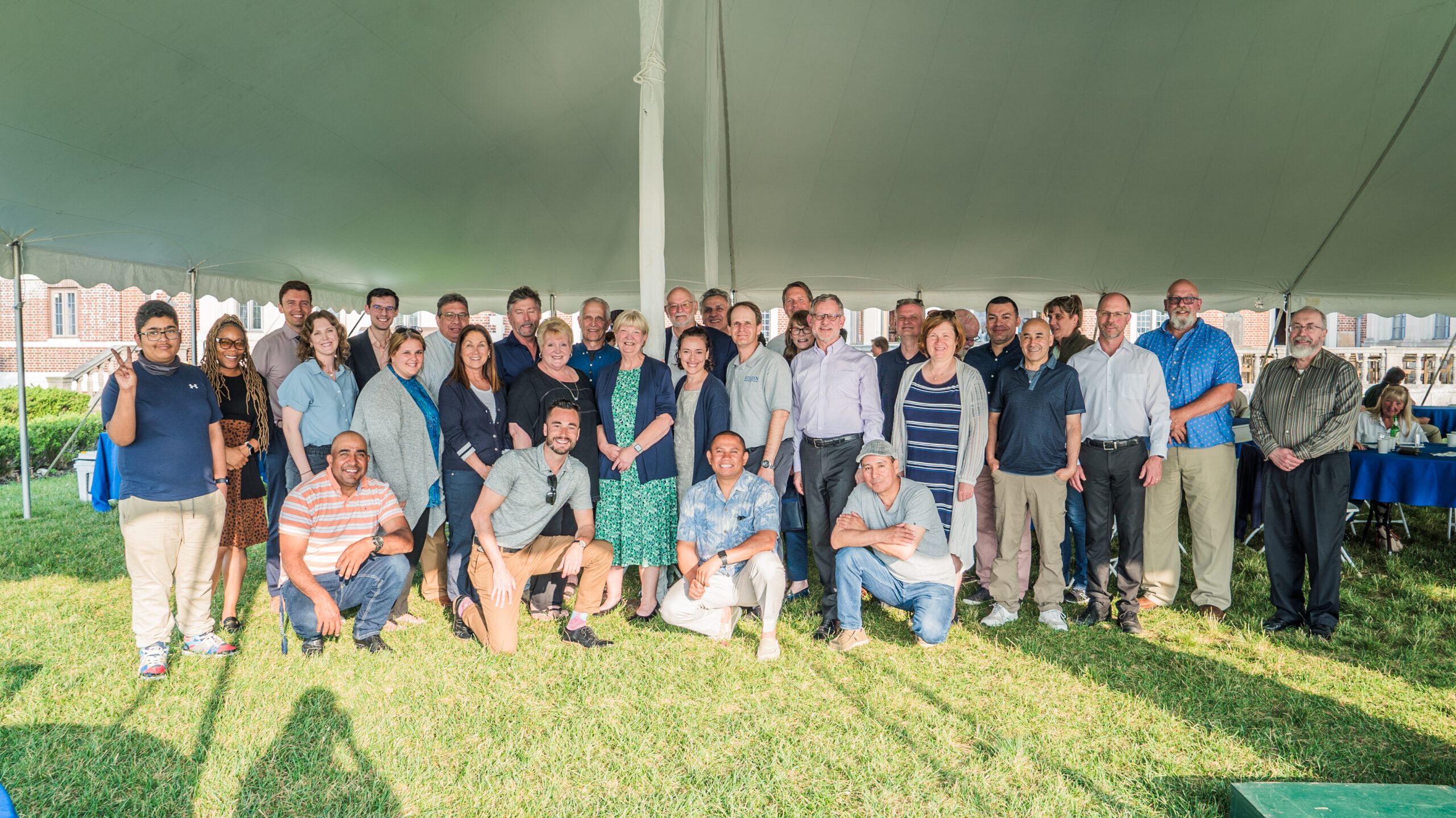
Webb’s administration, faculty, and friends
A Harmonious Intersection of Art and Engineering: World-Renowned Pianist, Alexei Tartakovsky Performs at Webb
When world-renowned Russian-American pianist, Alexei Tartakovsky played the music of Mozart, Chopin, and Schubert on the grand piano at Webb Institute on September 7, Webb became more than a school for future shipbuilders. It also became a hub for creators, architects, and engineers – entranced in the journey of musical art and creativity.
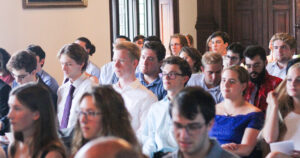
Students dressed in formal attire for a special night of timeless melodies.
“A fantastic musician and pianist,” enthused fellow classical pianist, Martha Argerich, which is a sentiment echoed by the New York Concert Review, calling him “one of the finest young pianists in recent years.”
From winning three top prizes in a single year to a unanimous first prize win at the Heida Hermanns International Piano Competition, Tartakovsky had always stolen the spotlight on international stages. To have him at Webb for our unique community was special.
What made this evening particularly meaningful was the collaborative spirit that brought Tartakovsky to our campus. “Our students not only excel in STEM; they have an appreciation for all facets of human achievement, including the arts and music,” commented Professor Goloubeva, one of the key orchestrators of the event, along with Professor Harris.
Professor Harris, coordinator of our Humanities program at Webb added, “Alexei Tartakovsky’s performance was an enhancement of our Humanities program, and a testament to the multidimensional and creative talent we cultivate here. You can see that our students felt the music deeply.”
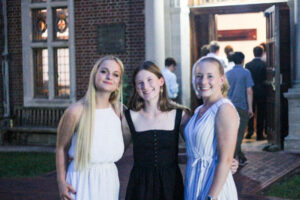
Webbies engage in conversation during the intermission of musical inspiration.
Jack Jackson, a member of the Leadership Committee responsible for the recital, said, “This event, the first of its kind for some of us, was a valuable chance for Webbies to experience the artistry of piano performance and expand our outlook on beauty beyond the engineering curriculum, and into the field of fine art.”
As we send our heartfelt gratitude to Alexei Tartakovsky, who continues his European tour this week in Bonn, we also thank Professor Harris and Gloubeva as well as our pro-active Leadership Committee which includes Thomas Motyka, Ben Calkins, Jack Jackson, Steven Katz and Burke Kanemasu.
Their collective effort enriched what it means to be a Webbie – to be able to take in the magic of engineering and the arts, including the music of Chopin in a Long Island mansion.
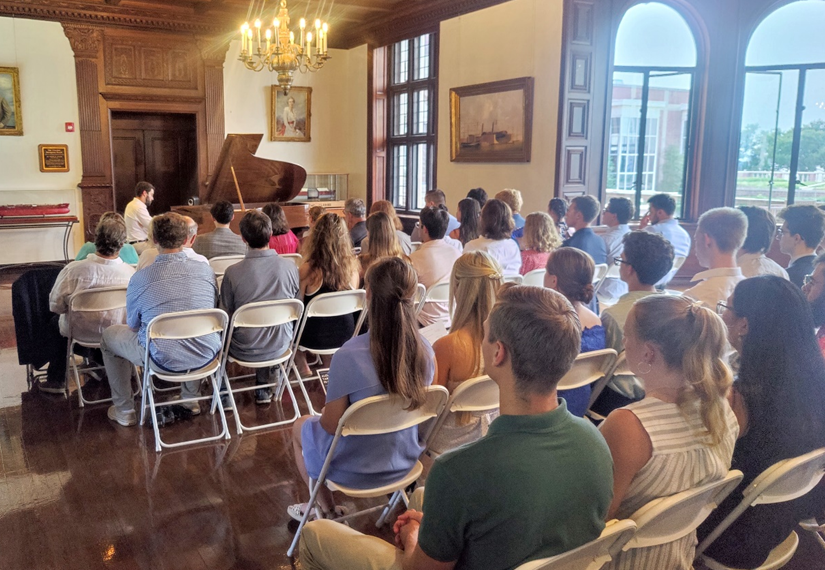
As Alexei Tartakovsky graced Webb Institute’s mansion with notes of classical music, this special night captured the essence of what makes Webb a beautiful place for both mind and soul.
Webb Responds to Supreme Court’s Decision on Affirmative Action
To the Webb community,
On June 29, the U.S. Supreme Court announced its decision on how colleges and universities may consider race in their admissions policies and practices.
The National Association of College Admissions Counseling (NACAC) has created an admissions/legal team to analyze the 237-page opinion and provide guidance in the coming weeks and months on compliance with the ruling. We will review our own policies and practices to ensure we are fully compliant.
Webb remains committed to an admission process that is merit-based and inclusive. We seek diversity amongst applicants who meet our high academic standards. The best and brightest applicants come from a diverse applicant pool. Webb has and continues to work to increase representation of all qualified individuals in its student body and is a far better place for it.
Our graduates enter industries that compete globally; navigating cultural differences is a vital skill, best developed in a diverse student body. The maritime industry continues to diversify, and we will support that transition. Our founder, William H. Webb, was a firm believer in the power of accessible education; we increasingly attract applicants who are first-generation college students, from a variety of backgrounds, hailing from families of limited means.
As we continue to explore this ongoing discussion, please do not hesitate to reach out to me and let us keep an open dialogue on how best to achieve our goals.
Regards,
Mark Martecchini
President

